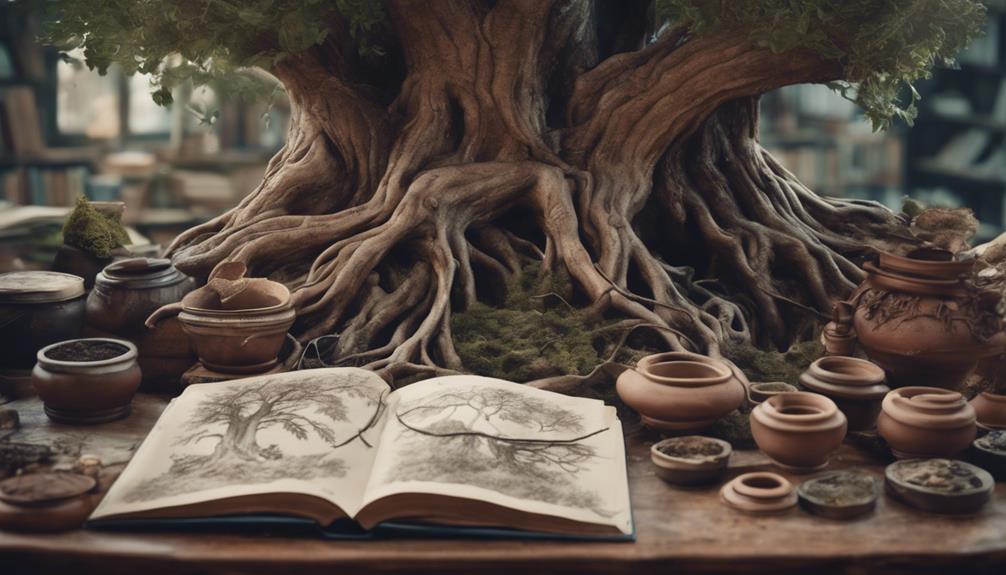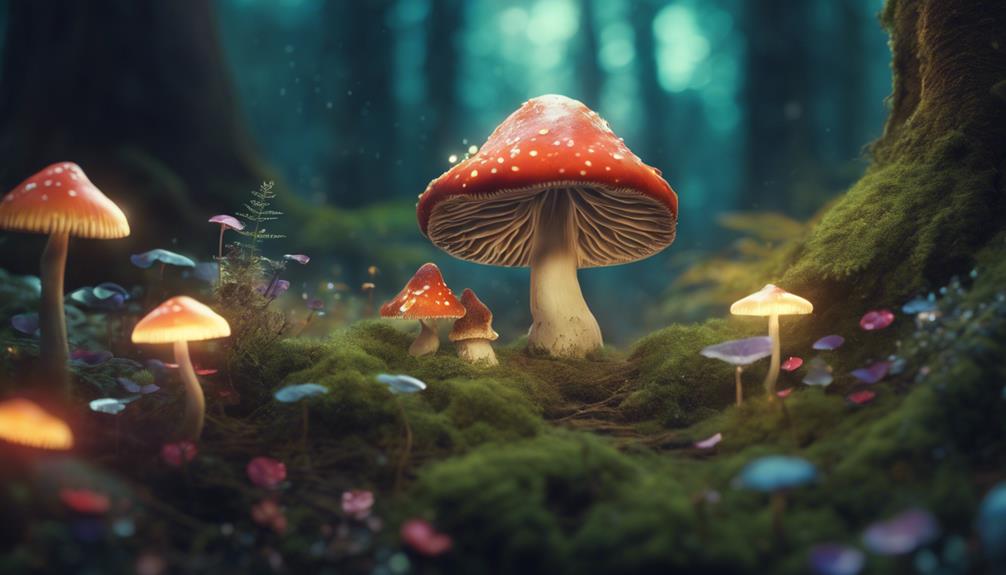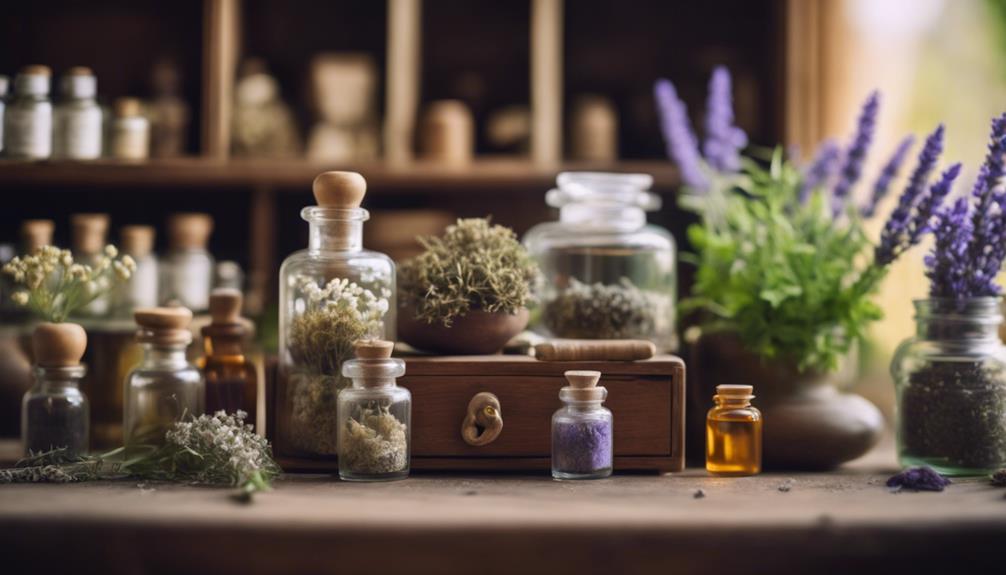We've been turning to herbal remedies for an astonishing 60,000 years, with written records of medicinal plant use dating back over 5,000 years to ancient civilizations such as Egypt, Mesopotamia, India, China, Greece, and Rome. Ancient traditions like Traditional Chinese Medicine, Ayurveda, and Unani Tibb have shaped modern healthcare practices. From the Middle Ages to modern times, herbal remedies have continued to play a significant role in healthcare. As we explore the complex history of herbalism, we'll uncover the intricate connections between traditional healing systems and their ongoing impact on contemporary healthcare practices. Let's unearth the fascinating story of herbalism.
Key Takeaways
• Herbal medicine dates back to the Paleolithic age, spanning 60,000 years.
• Written records of herbal remedies trace back over 5,000 years to ancient civilizations.
• Ancient cultures like Egypt, Mesopotamia, India, China, Greece, and Rome developed extensive herbal knowledge.
• Traditional healing systems like Traditional Chinese Medicine, Ayurveda, and Unani Tibb have roots dating back thousands of years.
• Herbalism has a recorded history of at least 5,000 years, with continued use and development over time.
Ancient Roots of Herbalism
As we explore the ancient roots of herbalism, we find that the use of medicinal plants stretches back an astonishing 60,000 years to the Paleolithic age. This remarkable history underscores the importance of herbal medicine in human societies.
Written records of herbal remedies date back over 5,000 years, showcasing the long history of herbalism. Ancient Chinese remedies have contributed greatly to the development of herbal medicine, leading to discoveries like artemisinin. In traditional Chinese medicine, medicinal plants play a crucial role, reflecting the ancient Chinese understanding of the interconnectedness of nature and human health.
The use of medicinal plants has been a cornerstone of medical knowledge in ancient civilizations, including Ancient Egypt, Mesopotamia, India, Greece, and Rome. It's clear that herbalism has been an integral part of human healthcare for thousands of years, with various cultures developing their unique approaches to herbal remedies.
As we explore further into the history of herbalism, we'll uncover the fascinating story of how different cultures have harnessed the power of medicinal plants to promote health and wellness.
Evolution of Herbal Practices
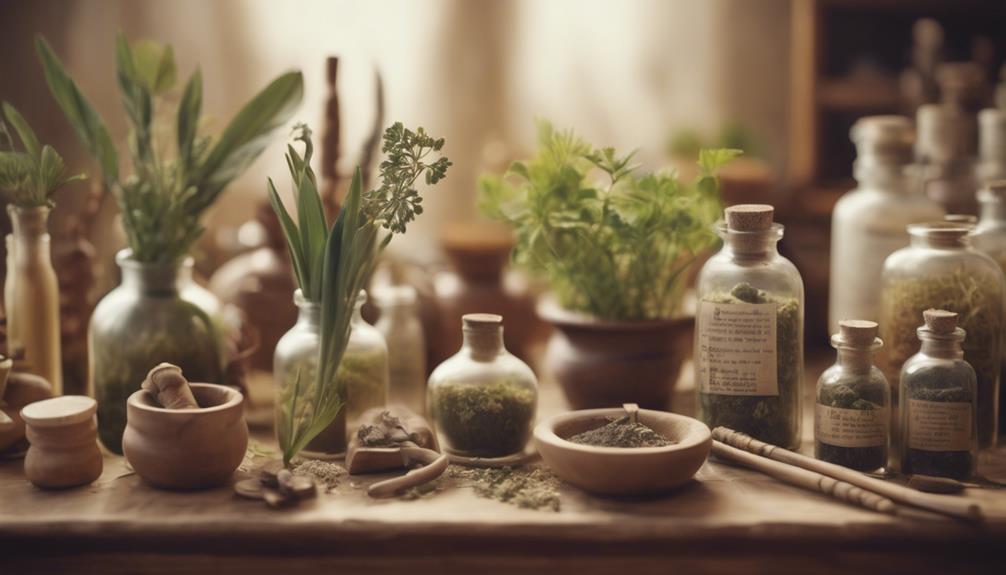
We'll explore how herbal practices evolved over time, from ancient civilizations to modern-day integrations of traditional knowledge with scientific validation.
Ancient civilizations like Egypt, Mesopotamia, India, China, Greece, and Rome developed extensive herbal knowledge and healing systems, including Chinese medicine.
The Monastic influence in the Middle Ages preserved and disseminated herbal knowledge, leading to the peak of herbal publications in the 16th century.
However, the 17th and 18th centuries saw a shift towards chemical drugs, eroding plant-based therapies. Despite this, herbal traditions persisted with figures like Samuel Thomson.
Today, modern herbalism integrates traditional knowledge with scientific validation, offering a well-rounded approach to healthcare in the contemporary world.
We've come a long way from ancient roots to modern applications, and it's fascinating to see how herbal practices have adapted and evolved over time.
By combining traditional herbal knowledge with modern scientific validation, we can create a more complete and holistic approach to healthcare.
This integration has led to a resurgence of interest in herbalism, offering a promising future for this ancient practice.
Traditional Systems of Healing
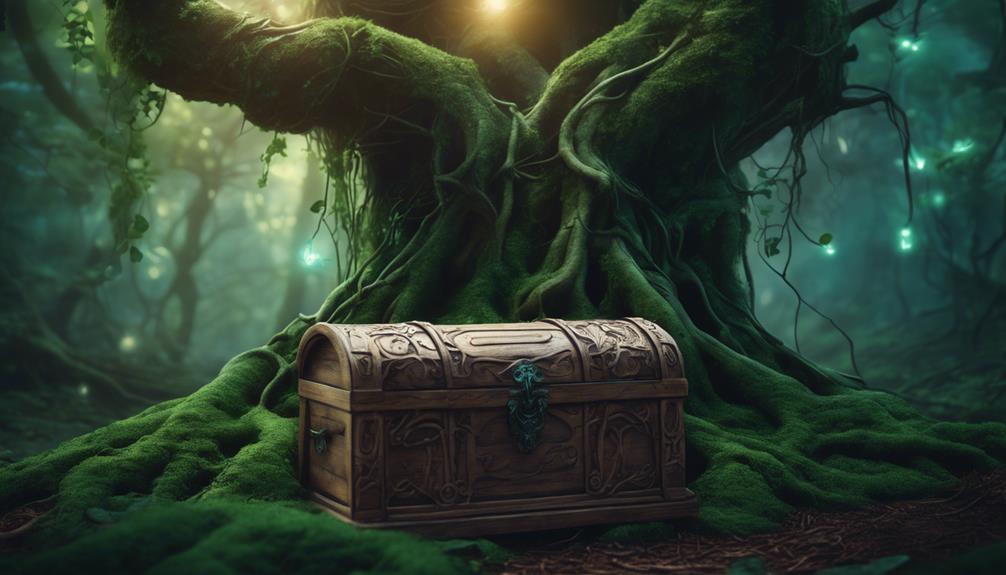
As we explore traditional systems of healing, we're going to examine some of the most influential and enduring approaches to herbalism.
We'll take a closer look at Ancient Chinese Medicine, which has made a substantial contribution to the discovery of life-saving remedies, as well as Ayurvedic Healing Practices, which have been refined over thousands of years.
We'll also explore the roots of Unani Tibb, a system that has evolved over centuries to incorporate diverse cultural influences.
Ancient Chinese Medicine
In ancient China, herbalism was inextricably linked with Traditional Chinese Medicine, a holistic system of healing that has evolved over millennia. As we delve into the history of herbalism, we find that Chinese medicine, which includes herbalism, dates back over 5,000 years.
Traditional Chinese Medicine (TCM) integrates ancient texts like the Huang Di Nei Jing with modern scientific principles, making it a unique and dynamic system of healing. Herbal remedies have been a fundamental part of Chinese healing practices for millennia, and their use has influenced global healthcare practices.
In fact, Chinese herbal medicine has contributed to the discovery of artemisinin, a key antimalarial drug. We've found that TCM's holistic approach to healthcare emphasizes balance and harmony within the body, and herbal remedies play an essential role in restoring this balance.
As we explore the ancient roots of herbalism, we're reminded of the significance of Traditional Chinese Medicine in shaping our understanding of healthcare practices today.
Ayurvedic Healing Practices
Exploring into the history of herbalism, it's evident that Ayurveda has played a significant role in shaping our understanding of plant-based medicine.
Ayurvedic healing practices offer a thorough approach to health and wellness by combining herbal remedies with lifestyle modifications and spiritual practices. Ayurveda focuses on treating the whole person, not just the symptoms of a disease.
The foundational texts of Ayurveda, the Charaka Samhita and the Sushruta Samhita, provide detailed information on herbal remedies and treatment methods. In fact, Ayurvedic medicine uses over 600 plant species for medicinal purposes, showcasing the rich tradition of herbalism within this healing system.
Practitioners create complex herbal formulations with multiple ingredients to address various health conditions and promote overall well-being. These formulations are tailored to individual needs, making Ayurveda a highly personalized approach to health.
Unani Tibb Roots
We shift our focus to another ancient healing tradition, Unani Tibb, which originated over 2,500 years ago in Greece and spread to the Middle East and South Asia. This traditional system of healing has a rich history, blending Greek medicine with Arabic and Persian medicine. Unani Tibb, which means 'Greek' in Arabic, emphasizes the balance of bodily humors for health and healing.
Some key aspects of Unani Tibb include:
- Integrating principles of Greek medicine with traditional Arabic and Persian medicine
- Focusing on natural remedies like herbs, diet, and lifestyle modifications to restore health and prevent disease
- Emphasizing the balance of bodily humors for overall health
- Using a holistic approach to address physical, mental, and spiritual well-being
- Providing personalized treatment plans tailored to individual needs
The Middle Ages and Beyond
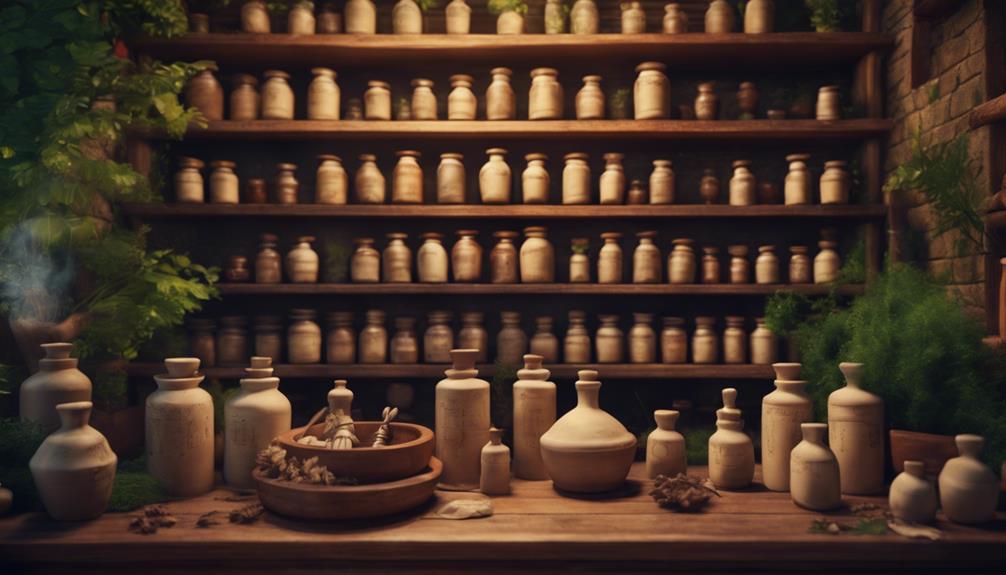
During the Middle Ages, as ancient herbal texts by Dioscorides and others circulated widely, monasteries emerged as important hubs for preserving and disseminating herbal knowledge. We saw a significant growth in interest in herbal medicine, particularly in the 10th century, with Benedictine monasteries playing a crucial role in this development.
These monasteries became centers of learning, where monks translated and copied herbal texts, preserving the wisdom of the past. As a result, herbal traditions flourished, and the Middle Ages marked a period of rich herbal traditions, trade, and geographic influences.
The translation of herbals facilitated the shift to the early modern era, allowing herbal knowledge to spread across borders. We can see that the Middle Ages were a pivotal time for herbalism, laying the foundation for the growth of herbal medicine in the centuries to come.
Herbalism in Modern Times

As we explore herbalism in modern times, we're met with a fascinating landscape of traditional practices meeting cutting-edge research. Today, herbal remedies continue to play a significant role in healthcare, with many prescription drugs tracing their origins back to ancient herbal remedies.
As we examine the current state of herbalism, we'll take a closer look at the remedies in use today and the ongoing research trends shaping the future of this ancient practice.
Herbal Remedies Today
Today, herbalism continues to evolve, with modern medicine acknowledging its significance by integrating herbal remedies into contemporary healthcare practices. As we explore the current state of herbalism, the importance of traditional medicine and alternative therapies intertwining becomes apparent. We're seeing a resurgence of interest in herbal supplements, with many people seeking natural remedies for various health concerns.
Some key aspects of herbalism today include:
- The ongoing integration of Chinese medicinal herbs into modern medical practices
- The growing demand for herbal supplements and herbal preparations
- The increasing recognition of herbal tradition in medical text and historical records
- The incorporation of herbal ingredients into conventional medical practices
- The exploration of herbal remedies as complementary alternative therapies
As we move forward, acknowledging the enduring relevance and impact of herbalism in contemporary times is crucial. With ongoing research and clinical trials, we're continually uncovering new evidence to support the safety and efficacy of herbal remedies.
As we continue to learn from the past, we're shaping a future where herbalism plays a crucial role in modern healthcare.
Current Research Trends
We're witnessing a surge in research focused on herbal medicine, driven by its potential to address a wide range of health concerns. As we investigate the current research trends, it's clear that herbal medicine is being studied for its impact on various chronic diseases, including coronary artery disease and cognitive function. The evidence suggests that herbal medicine may have a significant impact on these conditions, and researchers are working to uncover the specifics.
Studies are also examining the effects of herbal medicine on specific populations, such as patients with chronic hepatitis, cancer, and rheumatic diseases. Additionally, researchers are exploring the interactions between herbal medicine and prescription drugs, as well as the impact of dietary supplements on overall health. The goal is to provide evidence-based guidance on the safe and effective use of herbal medicine, particularly in conjunction with conventional treatments.
As researchers continue to explore the potential of herbal medicine, we're likely to see new breakthroughs in the treatment of chronic diseases and improved cognitive function. By understanding the complex interactions between herbal medicine and the human body, we can reveal the full potential of this ancient practice.
The Enduring Legacy of Herbalism
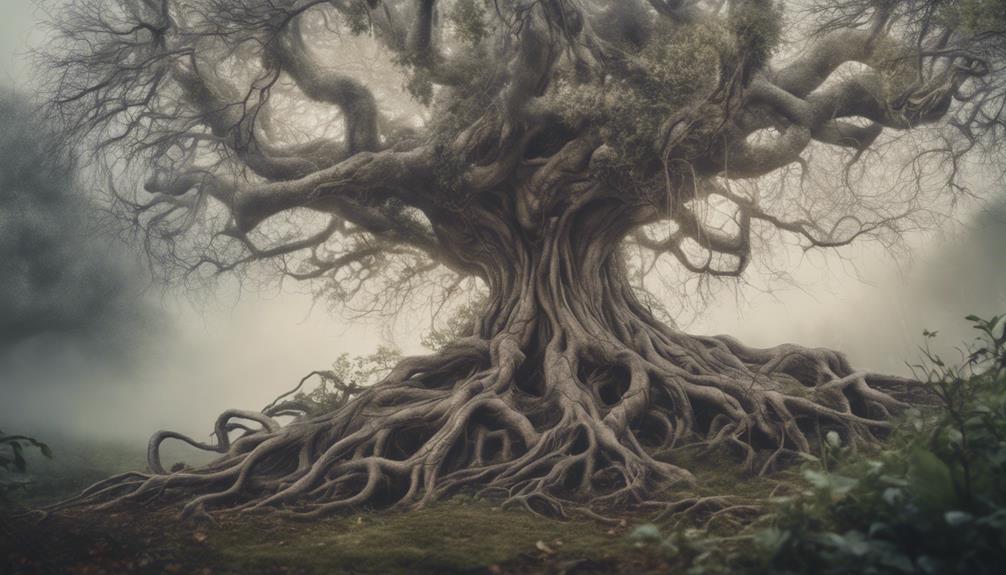
Through the centuries, we've witnessed herbalism's unwavering presence, with its roots firmly planted in ancient civilizations and its influence spreading across cultures and continents. As we explore the enduring legacy of herbalism, it's evident that this traditional practice has stood the test of time.
Some key highlights of herbalism's rich history include:
- Written records of herbal remedies dating back to ancient civilizations like Egypt, Mesopotamia, China, Greece, and Rome.
- The significant contributions of early Greek herbalists like Theophrastus, Diocles, and Krateuas to the development of herbal medicine.
- The complex formulas and practices of traditional Chinese Medicine (TCM) and Ayurvedic medicine, passed down for centuries.
- The widespread use of herbal remedies by Native Americans, who utilized over 2,500 plant species for medicinal purposes.
- The ancient roots of medicinal plant use, with evidence dating back over 5,000 years.
These examples showcase the profound impact of herbalism on human history, demonstrating its enduring legacy as an essential component of traditional healthcare practices.
Frequently Asked Questions
When Did Herbal Medicine Begin?
When did herbal medicine begin? We're curious about the origins of this ancient practice.
As we dig into history, we find evidence of medicinal plant use dating back an astonishing 60,000 years.
The Sumerians created the first written record of medicinal plants around 5,000 years ago, while ancient civilizations like the Egyptians, Greeks, and Chinese developed sophisticated herbal medicine systems thousands of years ago.
How Long Has Herbology Been Around?
As we explore the world of herbology, we find ourselves standing at the threshold of a timeless journey.
We're often left wondering, how long has herbology been around? The answer lies in the ancient civilizations that have harnessed the power of plants for centuries.
From the written records of ancient China to the traditional practices of Native American cultures, herbology has been a steadfast companion to humanity, providing solace and healing for thousands of years.
What Is the Oldest Herb?
We're curious about the oldest herb, and the answer takes us back in time.
According to ancient records, the oldest known herb is Soma, mentioned in the Rigveda, a Hindu scripture dating back to around 1500 BCE.
This herb, also known as Ephedra, was used in traditional medicine and religious rituals. Its uses ranged from treating respiratory issues to inducing a sense of euphoria.
Is Herbalism Illegal in the Us?
We imagine a world where botanical remedies are shunned, but thankfully, that's not the case in the US.
Herbalism is, in fact, legal in our country. We can breathe a sigh of relief, knowing that herbalists can legally provide remedies and treatments to clients.
While regulations vary by state, requiring some to meet specific licensing or certification requirements, herbalism itself isn't illegal.
Conclusion
As we weave through the tapestry of time, the threads of herbalism remain vibrant, interlacing ancient wisdom with modern discovery.
Like a rich broth, the flavors of traditional systems blend with contemporary practices, nourishing body and soul.
As the pendulum of history swings, herbalism endures, a testament to the human quest for wellness and harmony with nature.
Today, we savor the fruits of this timeless legacy, embracing the wisdom of the past to cultivate a healthier, more balanced future.

